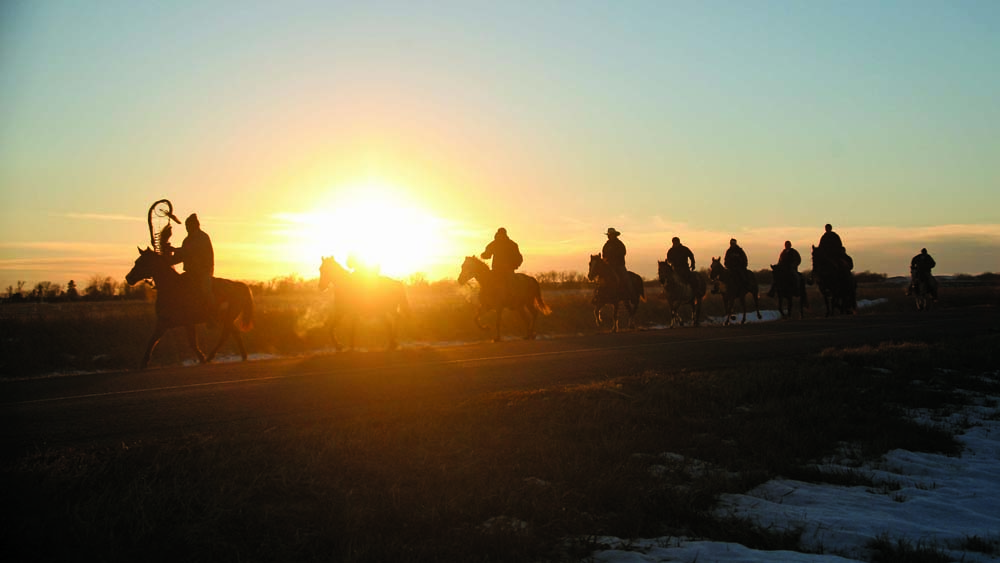 Around 50 men, women and children began a journey last Tuesday, riding horses from Crow Creek to Mankato in honor of 38 Sioux who were hanged 150 years ago on Dec. 26, 1862 following the bloody Dakota War of 1862.
Around 50 men, women and children began a journey last Tuesday, riding horses from Crow Creek to Mankato in honor of 38 Sioux who were hanged 150 years ago on Dec. 26, 1862 following the bloody Dakota War of 1862.
Their pilgrimage will conclude on Christmas Day in Mankato, Minn., where the hanging took place. A ceremony will be held on Dec. 26 in honor of their slain ancestors.
This is the eighth year for the ride, which was created in 2005 by Jim Miller, a Sioux spiritual leader. He urges the people on both sides to forgive and forget and forge a new world.
The riders are also commemorating the hanging of two more Indians in 1865 and have named the journey The Dakota 38 Plus 2 Reconciliation Ride.
The group passed through Woonsocket late Wednesday afternoon and finished up their second day on the road with a meal in the Community Center provided by the Woonsocket Community Club and Thrivent.
They boarded their 20+ horses at John Delvaux’s place on the west edge of town and continued east on Highway 34 the next morning following a short ceremony. Community leaders and Mayor Lindy Peterson met with the group to extend a welcome.
They are trading out horses every seven miles so as not to wear them out and are also trading out riders. A caravan of pickups and trailers are following the riders.
The mass hanging was the largest one-day execution in American history and took place at the end of the Dakota War of 1862, also known as the Sioux Uprising. Rising tensions between white settlers and bands of Sioux in southwest Minnesota led to battles breaking out between the settlers and Indians and later the United States Army and the Indians.
The fighting ended with the surrender of most of the Dakota Indians and by late December of 1862, more than 1,000 were taken into custody and interned in Minnesota jails.
The 38 were hanged after they and 303 prisoners were convicted during short trials and sentenced to death. President Abraham Lincoln commuted the death sentences of 264 prisoners and one was granted a reprieve.
Two Sioux leaders escaped to Canada, but were later captured and hanged in 1865, making them “Plus 2.”
A common practice at the time, a number of the cadavers were donated to doctors for study. One such doctor, William Worrall Mayo, received the body of Mahpiya Okinajin. Dr. W.W. Mayo established the private medical practice in Rochester, Minn., which later evolved into the Mayo Clinic.
In the late 20th Century the Mayo Clinic returned the identifiable remains of Mahpiya Okinajin to the Tribe for reburial.
-
Weather
Failure notice from provider:
Connection Error:http_request_failedUpcoming Events
July 2024 SSunday MMonday TTuesday WWednesday TThursday FFriday SSaturday 30June 30, 2024 1July 1, 2024 2July 2, 2024 3July 3, 2024 4July 4, 2024 5July 5, 2024 6July 6, 2024 7July 7, 2024 8July 8, 2024 9July 9, 2024 10July 10, 2024 11July 11, 2024 12July 12, 2024 13July 13, 2024 14July 14, 2024 15July 15, 2024 16July 16, 2024 17July 17, 2024 18July 18, 2024 19July 19, 2024 20July 20, 2024 21July 21, 2024 22July 22, 2024 23July 23, 2024 24July 24, 2024 25July 25, 2024 26July 26, 2024 27July 27, 2024 28July 28, 2024 29July 29, 2024 30July 30, 2024 31July 31, 2024 1August 1, 2024 2August 2, 2024 3August 3, 2024 -
Recent Posts
Contact Us
Archives

Tweet